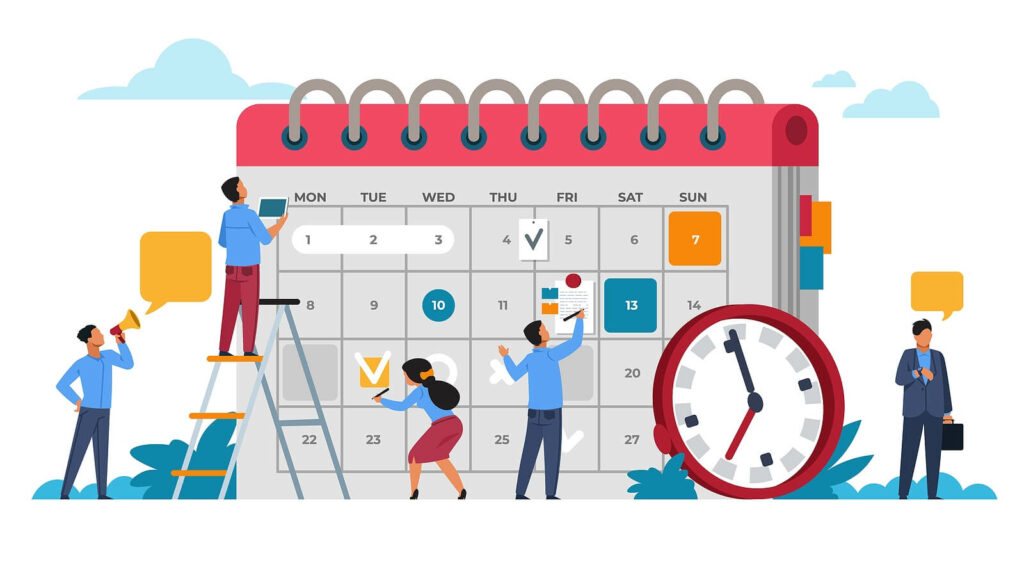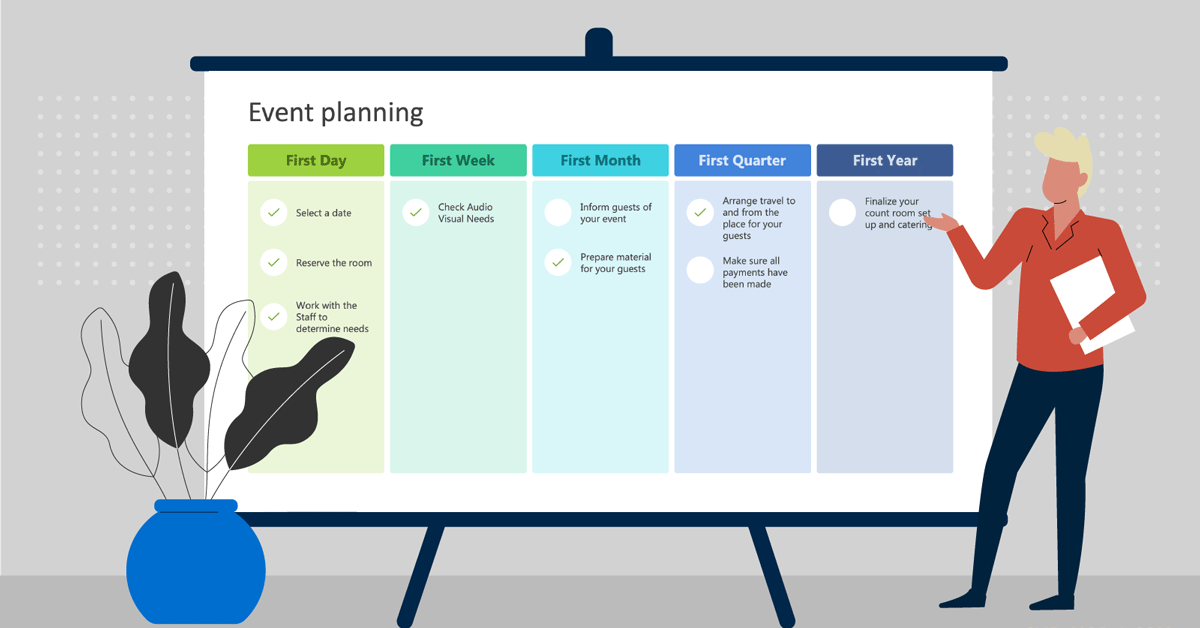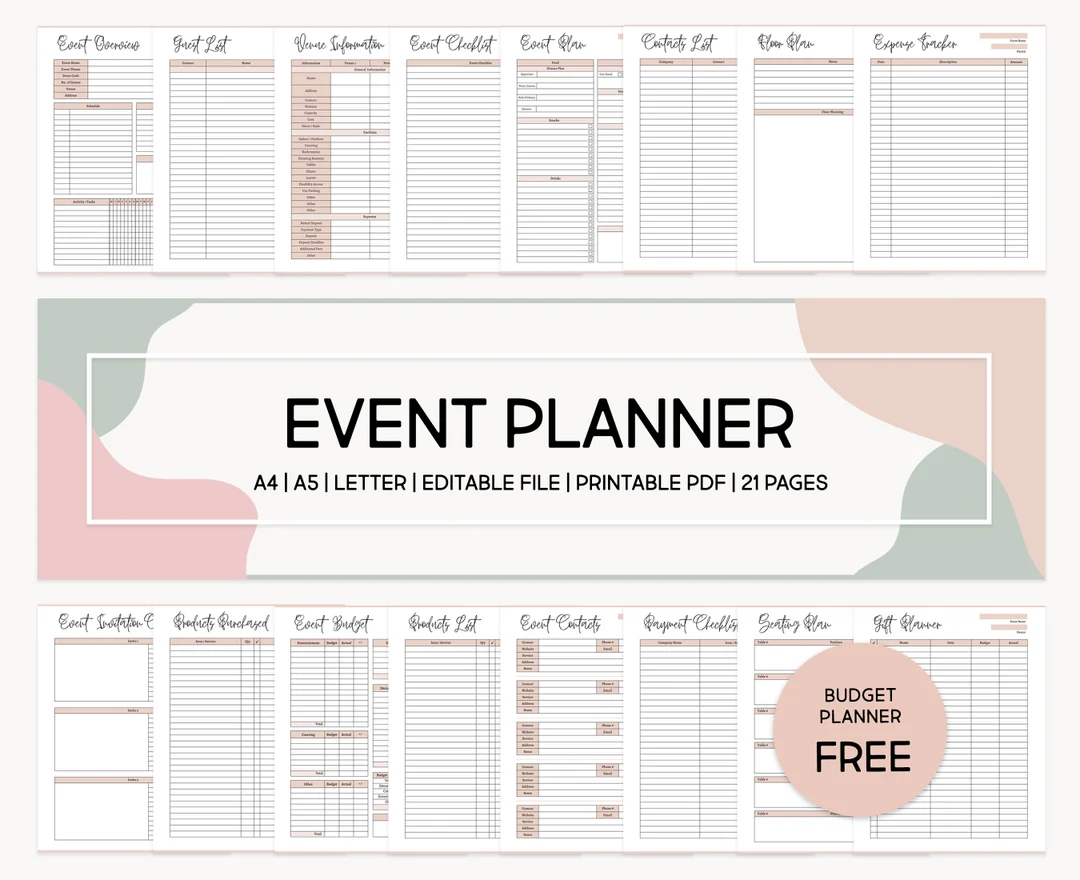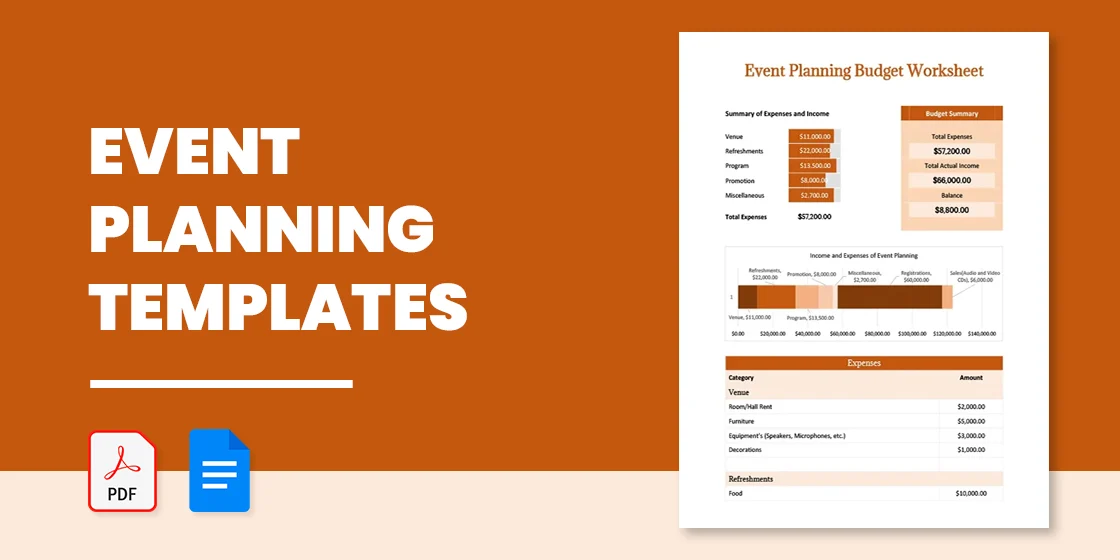Master Event Planning in 2024: Easy Steps to Crafting the Best Event
Planning an event isn’t a walk in the park. It’s a complex process that requires meticulous attention to detail, organization, and time management. But what if I told you there’s a tool that can simplify this process and save you from potential headaches? Enter: the event planning template.
An event planning template is your secret weapon for seamless event management. From budgeting to scheduling, it’s the roadmap that guides you through the labyrinth of event planning. Whether you’re a seasoned event planner or a newbie, you’ll find this tool invaluable.
Understanding Event Planning Templates

Building upon the concept introduced earlier, let’s delve deeper into the functionality and significance of event planning templates. They act as the backbone of successful event management, streamlining the complexities and offering a systematic platform for organization.
The Purpose of Using Templates in Event Planning
The purpose of using templates in event planning is twofold. First, they enhance efficiency by providing a structured framework for the myriad tasks involved in planning an event. Second, they reduce the possibility of oversight, indicating a clear timeline for task execution.
For example, when organizing a corporate fundraiser, an inherent multitude of tasks – from contacting potential sponsors, coordinating with the venue, to publicizing the event – demands meticulous organization. Here’s where an event planning template comes in handy. It breaks down these tasks into manageable chunks, outlines deadlines, and assigns responsibilities.
Templates also minimize the risk of forgetting important aspects. If you’re organizing a wedding, you wouldn’t forget to book a caterer or florist because it’s all there in your template, acting as a comprehensive checklist.
Core Elements of an Event Planning Template

Meanwhile, let’s demystify what constitutes an event planning template. Various elements converge to form such a template, each playing a crucial role.
- Objective: Clear objectives hold the event together, providing a vision for the forthcoming tasks. For instance, promoting a new product or fundraising for a charity.
- Timeline: A detailed timeline facilitates smooth progress, specifying when each task should commence and cease.
- Budget: No event can progress without budgetary constraints. Templates include a detailed budget allocation for every aspect of the event.
- Responsibility Assignment: Who guides the event to fruition? Assigning roles and responsibilities is key to prevent chaos.
- Soliciting Sponsorship: Particularly for corporate events, identifying potential sponsors and strategizing outreach fall within the template’s purview.
- Promotion and Publicity: A potent marketing strategy paves the way for success. The template guides promotional initiatives, from media coverage to online marketing.
So, as you can see, an event planning template serves as a compass navigating the tumultuous sea of event planning. The consecutive sections will present how to utilize them effectively.
Types of Event Planning Templates
In the spectrum of event planning, different types of templates cater to separate event categories. Each template considers the unique elements and intricacies of organizing specific events. Below, I’ve explored three common types of event planning templates.
Weddings and Private Celebrations
Private events like weddings demand meticulous planning. Templates for weddings and private celebrations focus on managing guest lists, track RSVPs, organize seating charts, and accommodate catering and menu choices. For instance, a wedding template would prominently feature sections for the ceremony and reception layout, vendor contracts, and contingency plans for weather changes. Similarly, a birthday party template might include components for party theme selection, entertainment bookings, and the party timeline.
Corporate Events and Conferences
Templates for corporate events and conferences tend to be more function-driven, reflecting the professional nature of these events. They prioritize scheduling, budget planning, speaker management, and content coordination. For example, a corporate conference template must take into account not only the event venue and registration process but also details like potential panel discussions, breakout sessions, and networking opportunities. It’s common to find sections dedicated to sponsorships, marketing strategies, and evaluations in these templates.
Non-Profit and Community Events
Non-profit and community event planning templates, on the other hand, are integral for managing resources effectively and rallying community support. Emphasized features in such a template might include volunteer coordination, donor outreach, community partnership development, and promotional activities. A community fun run event template, to be specific, would need dedicated spots for route planning, medical support, local sponsor solicitations and registration procedures. Such templates generally maintain a strong focus on objectives, measurable outcomes, and community engagement.
Selecting the Right Event Planning Template
Picking out the ideal tool in your arsenal of event planning is essential. In this section, I’ll unfold the process of selecting the right event planning template.
Factors to Consider
When considering the right event planning template, several factors come into play. First, the nature of the event dictates the features required in the template. Corporate events and conferences call for detailed templates that cover everything from agenda scheduling to speaker coordination and contract negotiation. On the other hand, weddings and social gatherings focus on elements such as guest lists, seating arrangements, and personal touches that reflect the host’s style.
Second, the size of the event matters. Larger events require more advanced templates that include sections for personnel assignments, vendor management, and comprehensive budgeting. Smaller events benefit from simpler, straightforward templates.
Lastly, the tool’s ease-of-use ranks high in importance. Even the most comprehensive template fails if it’s too complicated for the team to use. Look for a template that strikes a balance between detailed planning capabilities and user-friendly design.
Customization Tips
Despite the plethora of templates available, customized solutions often prove the best fit. A few tips help in fine-tuning templates to match specific event needs.
Start by identifying elements most critical to the event. These form the core sections of the template. For a corporate fundraiser, for instance, sponsorship solicitation and budget allocation take center stage. A community fair, meanwhile, prioritizes volunteer coordination and community engagement.
Next, maintain a lean template design. Include necessary information, certainly, but avoid cluttering the tool with excessive details. Not every template requires a seating chart or an elaborate promotion plan.
Lastly, consider leaving room for contingency plans. Unforeseen circumstances happen, and an adaptable template lets you respond more effectively. Include a section for potential risks and their corresponding mitigation strategies. It’s not about expecting disaster, but simply being prepared for whatever the event throws at you.
Remember, a well-designed template acts as a roadmap for efficient and successful event planning. Picking the right one entails considering the event’s unique characteristics and prioritizing customization. With the correct template, organizing a successful event becomes a considerably more manageable task.
Maximizing the Use of Your Event Planning Template
In our progressive journey through the versatile landscape of event planning templates, let’s upgrade our approach. The secrets to truly unlock their potential lie in streamlining workflows and avoiding mistakes commonly tied to event planning.
Streamlining Workflow
Managing an event revolves around dealing with dynamic components concurrently. An event planning template, at its root, facilitates organization. Strategic application of these functionalities, however, maximizes efficiency, ensuring smoother workflow.
Emphasis falls on task breakdown. A template effectively segregates big objectives into achievable, smaller goals, complete with appropriate timelines. This structured approach minimizes oversight, leading to quicker completion. For example, in the case of a corporate event, a template lays down stages from procurement of location and amenities, allocation of funds, booking of speakers, to managing attendees registration.
Furthermore, another noteworthy method of enhancing workflow involves delegation. Owing to the clarity provided by templates, managers ascertain task distribution comfortably. Assigning roles depending on their specialty enhances performance, and this tactic can be easily tracked through the template, boosting accountability.
Additionally, templates aid in perfecting time management. Predetermined deadlines on tasks render a roadmap, offering a well-defined directive which supports in avoiding procrastination and ensuring prompt completions.
Avoiding Common Mistakes
Rookie errors or even oversight by seasoned managers can disrupt event planning. Templates emerge as a preventive tool, reducing the likelihood of such incidents.
The most common mistake encountered is straying from a budget. A robust template iterates financial boundaries at every stage, discouraging overspending. For instance in catering arrangements, appropriate budget limits maintain a balance among food quality, quantity, and cost.
Inaccessibility of crucial data forms another frequent problem. Templates centralize all requisite information, ensuring it’s at managers’ fingertips when needed, mitigating any risks of information loss.
Lack of contingency planning often leads to last-minute chaos. Commendable event planning templates house an emergency protocol. This reserve plan is instrumental when unforeseen hurdles strike, ensuring event success even against odds.
An optimized use of templates indeed acts as a catalyst in the event management process, rendering it more streamlined, error-free and efficient overall. Harnessing their utilities adequately, you’re guaranteed a successful event, eliminating hassles and challenges. Remember, it’s not only about utilizing tools but mastering their use for effective results.
Top Tools and Software for Event Planning
Harnessing the full potential of event planning templates often involves leveraging certain tools and software. These tools, available in both free and paid versions, can elevate your event organization process, ensuring a seamless execution and efficient utilization of resources. By emphasizing functionality, integrations, and compatibility, you can further streamline event planning initiatives.
Free and Paid Options
When choosing the right tools for event planning, a factor that often requires attention is cost. Some useful tools offer complimentary versions while others necessitate payment for access.
Eventbrite, Canva, and Google Sheets stand as examples of free tools that usher in impressive features. Eventbrite, for instance, assists in creating event registration pages, managing guest lists, and facilitating online ticket sales. Canva offers a plethora of design templates for promotional materials, while Google Sheets provides spreadsheets that aid in tracking tasks and budget breakdowns.
On the paid spectrum, Monday.com, Cvent, and Whova offer more extensive features. To illustrate, Monday.com brings efficiency in project management, while Cvent specializes in event management and ticketing. Whova, meanwhile, excels as a comprehensive event app providing pre-event networking and interactive polls for attendees.
Integrations and Compatibility Considerations
Another aspect to consider when choosing event planning tools is their ability to seamlessly integrate with your existing systems and software. By facilitating data transfer and synchronization across platforms, such integrations can significantly streamline workflows.
For example, communication tools like Slack exhibit excellent compatibility with project management software such as Asana and Trello. Google Workspace integrates well with a myriad of tools, supporting the collective functionalities of Google Docs, Sheets, and Calendar.
Paying heed to these factors ensures that you not only select the right tools but also efficiently incorporate them into your event planning processes, thereby enhancing the effectiveness of the event planning templates you utilize. By doing so, you further refine the planning process and guarantee more successful events.
Tips for Creating Your Own Event Planning Template

When it comes to creating your own event planning templates, there are several key considerations to bear in mind. Accommodating detail and flexibility, as well as incorporating feedback for continuous improvement, are critical factors in building an effective template.
Balancing Detail with Flexibility
In the world of event planning, striking a balance between detail and flexibility is essential. On one hand, your template must be precise, charting task assignments, timelines, budgets, and milestones in clear, quantifiable terms. For instance, rather than just stating “Arrange the venue”, you might break this task down into specifics like “Book the venue by March 1st, sign the agreement and make the initial payment by March 10th, and confirm final attendee numbers by May 1st”. By defining specific tasks, deadlines, and responsibilities, your event planning template can serve as a comprehensive guide that leaves nothing to chance.
On the other hand, your template must also accommodate unexpected changes, be it schedule shifts, budget revisions, or last-minute additions. This is where flexibility comes into play. Ensure there’s room in your template to adjust timelines or budgets without throwing the entire plan off track. For example, instead of allocating rigid dates for tasks, assign a time frame. Similarly, instead of fixing an exact budget, provide a budget range to cater for unforeseen cost variations.
Incorporating Feedback and Continuous Improvement
The most effective planning templates are not static, but dynamic tools subject to ongoing refinement. And for that, ‘Feedback and Continuous Improvement’ stands paramount.
Feedback is a valuable source of insights that can enhance the effectiveness of your event planning templates. After each event, collect feedback from team members, vendors, sponsors, and attendees. Use online survey tools like Google Forms or SurveyMonkey to gather these insights and document them within your template. You may find out, for example, that the task distribution was unbalanced or the timeline unrealistic.
Use such feedback to update the template continuously. Revise timelines where necessary, adjust budget allocations where they fell short, or fine-tune task assignments based on what worked and what didn’t. Remember, the goal isn’t just to create an event planning template, but to continually refine it to ensure more efficient and effective event planning with each use. By doing so, you’re not just creating a tool for organizing individual events, but a repository of knowledge and experience that can inform and improve all future events.
Conclusion
So we’ve journeyed through the world of event planning templates, and it’s clear they’re not just a nice-to-have, but a must-have tool for any event planner. They’re your ticket to a streamlined planning process, with their structured approach transforming overwhelming tasks into manageable pieces. Remember, the key elements – objectives, timelines, budgets, responsibilities, sponsorships, and promotions – are your guiding stars. But don’t forget, it’s not just about creating a template. It’s about striking a balance between detail and flexibility, and it’s about learning, refining, and improving with each event. So, embrace these templates, let them guide your event planning journey, and watch as they revolutionize your process, making it more efficient and effective with each use. The power of a well-crafted event planning template is truly remarkable, and I can’t wait to see how it elevates your event planning game.
Frequently Asked Questions
What are event planning templates?
Event planning templates are tools used to simplify the event planning process. They offer structure and efficiency by breaking down tasks into manageable parts with explicit deadlines and responsibilities.
How do event planning templates work?
These templates work by organizing key elements of event planning, like objectives, timelines, budget allocation, and responsibility assignment as well as sponsorship solicitation and promotional strategies.
What is the importance of flexibility in event planning templates?
Flexibility is crucial in event planning templates as it allows room for unforeseen changes and adjustments, ensuring the plan remains relevant and effective despite potential challenges or shifts.
How is detailed specificity beneficial in event planning templates?
Specificity helps define precise tasks, deadlines, and responsibilities, ensuring a thorough understanding of what is expected in each step of the event planning process.
Why is continuous feedback crucial in optimizing event planning templates?
Continuous feedback helps refine the event planning templates by identifying areas of improvement. That way, each version of the template becomes more efficient and effective in handling event planning tasks.

Leave a Reply